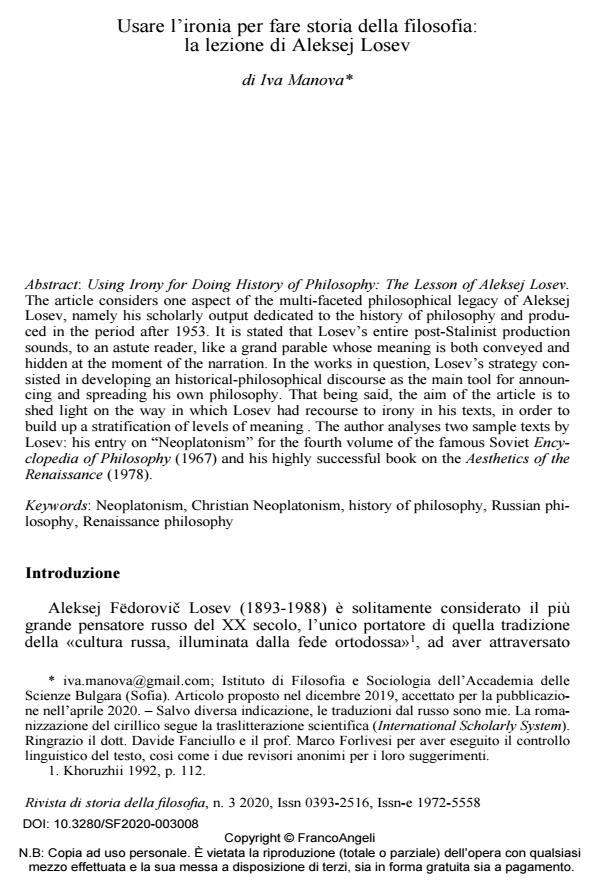Using Irony for Doing History of Philosophy: The Lesson of Aleksej Losev.
Journal title RIVISTA DI STORIA DELLA FILOSOFIA
Author/s Iva Manova
Publishing Year 2020 Issue 2020/3
Language Italian Pages 16 P. 529-544 File size 120 KB
DOI 10.3280/SF2020-003008
DOI is like a bar code for intellectual property: to have more infomation
click here
Below, you can see the article first page
If you want to buy this article in PDF format, you can do it, following the instructions to buy download credits

FrancoAngeli is member of Publishers International Linking Association, Inc (PILA), a not-for-profit association which run the CrossRef service enabling links to and from online scholarly content.
The article considers one aspect of the multi-faceted philosophical legacy of Aleksej Losev, namely his scholarly output dedicated to the history of philosophy and produced in the period after 1953. It is stated that Losev’s entire post-Stalinist production sounds, to an astute reader, like a grand parable whose meaning is both conveyed and hidden at the moment of the narration. In the works in question, Losev’s strategy consisted in developing an historical-philosophical discourse as the main tool for announcing and spreading his own philosophy. That being said, the aim of the article is to shed light on the way in which Losev had recourse to irony in his texts, in order to build up a stratification of levels of meaning . The author analyses two sample texts by Losev: his entry on "Neoplatonism" for the fourth volume of the famous Soviet Encyclopedia of Philosophy (1967) and his highly successful book on the Aesthetics of the Renaissance (1978).
Keywords: Neoplatonism, Christian Neoplatonism, history of philosophy, Russian philosophy, Renaissance philosophy
- - Antonov, Bernackij 2006: Konstantin Antonov, Michail Bernackij, Recenzija na knige Bibichin V.V., Aleksej Fëdorovi! Losev. Sergej Sergeevi! Averincev. Moskva 2004, «Vestnik Pravoslavnogo Svjato-Tichonovskogo Gumanitarnogo Universiteta», serija I: Bogoslovie. Filosofija, IV (2006), 15, pp. 192-195.
- - Bachtin 1965: Michail Bachtin, Tvor"estvo François Rabelais i narodnaja kul’tura srednevekov’ja i Renessansa, Chudo"estvennaja literatura, Moskva 1965.
- - Bachtin 1979: Michail Bachtin, L’opera di Rabelais e la cultura popolare. Riso, carnevale e festa nella tradizione medievale e rinascimentale, tr. it. M. Romano, Einaudi, Torino 1979.
- - Batkin 1978: Leonid Batkin, Italjanskie gumanisty: stil’ $izni i stil’ my!lenija, Nauka, Moskva 1978.
- - Batkin 1990: Leonid Batkin, Gli umanisti italiani: stile di vita e di pensiero, tr. di G. Alifredi, Laterza, Roma-Bari 1990.
- - Batkin 2002: Leonid Batkin, Pristrastija: Izbrannye ėsse i stat’i o kul’ture, RGGU, Moskva 20022.
- - Blakeley 1975: Thomas Blakeley (ed.), Themes in Soviet Marxist Philosophy: Selected Articles from the ‘Filosofskaja Enciklopedija’, Reidel, Dordrecht 1975 (Sovietica, 37).
- - Dynnik 1957-1965: Michail Dynnik et al. (a cura di), Istorija filosofii, 6 voll., Nauka, Moskva 1957-1965.
- - Emerson 2004: Caryl Emerson, On the Generation That Squandered Its Philosophers (Losev, Bakhtin, and Classical Thought as Equipment for Living), «Studies in East European Thought», LVI (2004), 2, pp. 95-117.
- - Evlampiev 2018: Igor’ Evlampiev, Soviet Studies in Renaissance Philosophy as a Basis for Developing a New View on History (1960-1980s), «Rivista di storia della filosofia », LXXIII (2018), 2, pp. 327-339.
- - Gurevi! 1983: Aron Gurevi!, Kategorii srednevekovoj kul’tury, Iskusstvo, Moskva 1972.
- - Gurevi! 1983: Aron Gurevi!, Le categorie della cultura medievale, tr. it. C. Castelli, Einaudi, Torino 1983.
- - Gusejnov 2009: Gasan Gusejnov, The Linguistic Aporias of Alexei Losev’s Mystical Personalism, «Studies in East European Thought», LXI (2009), 3, pp. 153-164.
- - Haardt 1993: Alexander Haardt, Husserl in Rußland: Phänomenologie der Sprache und Kunst bei Gustav #pet und Alexej Losev, Wilhelm Fink, München 1993.
- - Jakovlev 1995: Anatolij Jakovlev, Ot izdatel’stva, in Losev 1995, pp. 3-4.
- «Una fisionomia predatoria»: la Gioconda e il "mito sovietico" nella lettura di Aleksej Losev Olga Igorevna Kusenko, in RIVISTA DI STORIA DELLA FILOSOFIA 1/2022 pp.157
DOI: 10.3280/SF2022-001009 - A way out of hell: Dante and the philosophy of personal salvation in post-Soviet Russia Olga Igorevna Kusenko, in Studies in East European Thought /2023 pp.709
DOI: 10.1007/s11212-022-09519-5
Iva Manova, Usare l’ironia per fare storia della filosofia: la lezione di Aleksej Losev in "RIVISTA DI STORIA DELLA FILOSOFIA" 3/2020, pp 529-544, DOI: 10.3280/SF2020-003008